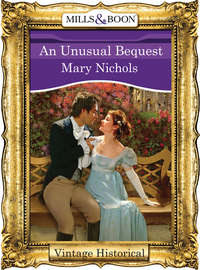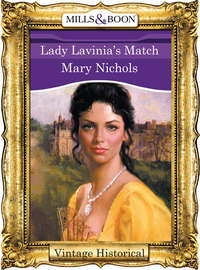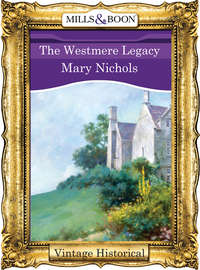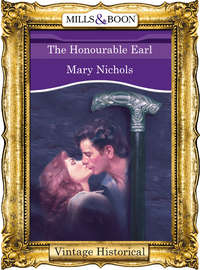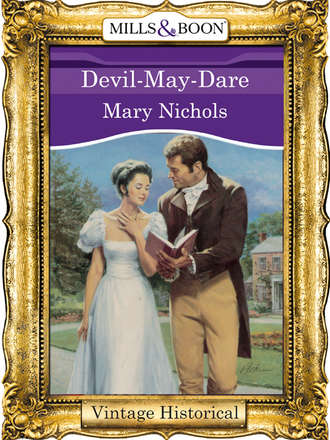
Полная версия
Devil-May-Dare
‘It’s that or nothing,’ he said, trying in vain to keep a serious face. ‘Do you dare?’
‘My lord, you should know I never refuse a dare.’
‘Then I will call for you the day after tomorrow. Shall we say at two?’
Oh, she should never have been so rash, she decided, as she lay sleepless in the early hours; it was almost as if the two glasses of champagne she had consumed had bemused her senses. Accepting the Marquis’s dare was enough to put her beyond the pale, but the wager with her brother was almost criminal and certainly cruel. She began to wonder how she would feel if she were Amelia Thornton and such a prank were played on her. Mortified and humiliated were the words that came to mind. No, she could not do it and she would tell Tom so. If it cost her twenty pounds, then so be it.
But her brother was nowhere to be found when she rose towards noon and went in search of him. His bed, she discovered, had not been slept in and his valet vouchsafed the opinion that Mr Wenthorpe had gone on to play cards after escorting her and her aunt home after the ball; Barber had been told not to wait for him, so he could not be sure. Forced to wait for Tom’s return, she decided to go for a ride and, ordering her horse to be saddled, she went to her room, changed into the blue velvet habit, perched the beaver on her curls and made her way to the stables, determined to gallop off her fit of the blue devils.
The day was fine, with a promise of spring, and Hyde Park was full of horses and carriages, barouches, phaetons, curricles, tilburys and gigs, each one containing its share of fashionable ladies, demireps and débutantes, together with their escorts, all wanting to be noticed, and the pace they were setting was slow, if not actually stationary. Riders were also out in great numbers on high-stepping thoroughbreds, neat little cobs and hired hacks. She saw Lord Longham sitting astride a huge black stallion, engrossed in conversation with a modishly dressed lady in a barouche across the railing which divided the Row from the carriageway. They were laughing together, oblivious to others around them. Lydia reined in; she was in no mood to exchange polite nonsense when all she could think of was that foolish wager. He looked up and their glances met and held. Disconcerted, she wheeled her mount away and cantered off.
Finding herself in what might pass in the metropolis for open country, she set the horse to gallop with Scrivens vainly trying to keep up. ‘It won’t do, Miss Lydia,’ he called after her. ‘It won’t do. At ’ome in Raventrees it don’ matter, but in London…’ When she returned home she was in a much better humour and even the scolding her aunt gave her for being late for nuncheon failed to dampen her spirits.
It was Tom who managed to do that. She met him on the stairs on her way to change out of her habit. His face was grey from lack of sleep, his hair was tousled and his cravat tied so carelessly it resembled nothing so much as a dishcloth. ‘Tom, have you been up all night?’ she demanded.
‘Got caught up in a game at White’s,’ he said.
‘Oh, Tom, you haven’t lost a great deal of money, have you?’ She looked directly into his face, but he could not meet her eye. ‘Oh, you buffle-head! What will Papa say?’
He caught her hand and pulled her into his room, where he shut the door firmly. ‘It ain’t that much and he need never know.’
‘How much?’
He hesitated, then mumbled, ‘Five hundred.’
‘Five hundred!’ she squeaked, shocked to the core. ‘How could you possibly have let it happen? Did you give them vowels?’
‘Yes. I promised to pay by the end of the month.’
‘How? Your allowance will never cover it.’
He smiled sheepishly. ‘No, but I thought of a capital hum. I wagered five hundred that you would persuade Lady Thornton you were an eligible bachelor and would stand up with Miss Thornton at a ball.’
‘You did what?’ She sat down heavily on the bed, hardly able to believe her ears.
‘You can do it, you know you can,’ he went on, unperturbed. ‘It’s only like playing charades.’
She was almost angry enough to slap him. ‘Who did you make this outrageous bet with?’
‘Douglas Fincham. I have either to give him five hundred guineas by the end of the month or you have to become a man for an evening.’
She stared up at him. ‘Oh, Tom, Tom, what have you done?’
‘It was your idea in the first place, or I would never have thought of it.’
‘It was a cork-brained idea. I changed my mind almost at once and decided to pay you the twenty pounds and forget the whole thing.’
‘But Lydia, you can’t,’ he said in anguish. ‘It will ruin me. I shall never hear the last of it. I shall be ostracised.’
‘Serve you right.’
‘Oh, Lydia, you can’t mean that. I’ve got you out of any number of scrapes in the past…’
‘Childish pranks,’ she said with asperity. ‘They were not like this at all.’ She paused as the implication of what he had done came to her. How could she face everyone if it became public knowledge that she fancied herself as a man? She would lose what friends she had and the Marquis of Longham would be confirmed in his belief that she was the most outrageous hoyden in the country. She would never be able to look into those searching eyes again. ‘Did you enter it in the betting book for all the world to see?’
‘No, for it would not do for it to become public or Lady Thornton might hear of it. It was a private bet.’ He stood looking down at her, unable to believe that she was prepared to renege on a wager; such a thing was unheard of, either for her or for him or anyone else who valued their reputation. ‘That don’t mean it don’t have to be honoured,’ he said. ‘Besides, Fincham…’
‘You could not have chosen a worse person to gamble with,’ she put in sharply. ‘He will never keep his tongue between his teeth if you do not pay up.’
‘Do you think I don’t know that?’ he said miserably.
‘We can’t let it come to that.’
He brightened considerably. ‘You’ll do it?’
‘I have only to deceive Lady Thornton?’ she queried, her heart sinking. ‘I may take Miss Thornton into my confidence?’
‘No, you have to convince everyone and that includes Miss Thornton,’ he said. ‘And you have to complete the dance and leave undiscovered.’
‘Supposing I cannot do it?’
‘Oh, you can, you know you can. Oh, Lydia, do this for me, I beg you.’
‘I don’t see why I should make a fool of myself so that you may not make a fool of yourself,’ she said. ‘You must tell Papa.’
‘Lydia, I’ll die sooner than do that. Please…’
‘How many other people know of this wager?’
‘Only Frank Burford and a steward at the club.’
‘Frank?’ she queried. ‘Is he in it too?’
‘Well, you know old Frank. He must needs put his stake in.’ He smiled suddenly. ‘He has already seen you in disguise, don’t forget.’
‘In the schoolroom! That hardly counts and, besides, I had costumes and make-up there.’
‘What costumes and make-up do you want? I’ll undertake to obtain them for you. It would not do for you to be seen buying such things.’
‘I don’t know, I shall have to think about it. How am I to disguise curves I should not have and fill out those places where I am lacking…?’
‘A tight waistcoat, padded shoulders and a little more fullness in the breeches. I am sure you can contrive.’
‘Does it have to be a ball or will a small supper dance suffice?’
‘It was not stipulated.’
‘Then we will aim for a quiet evening where the lighting is likely to be more subdued than at a grand affair and the fashions need not be so up to the mark.’
‘Then you will do it!’ It was surprising how his weariness left him and his face came alight at the prospect of this burden being lifted from his shoulders. ‘Oh, Sis, I knew you would. You’ve saved my bacon.’
‘Only if I succeed.’ It was madness to contemplate it, she knew, but if she could pull it off and the young Comte de Clancy was afterwards to disappear never to be seen again no harm would be done and Papa need never know what a young fool his son had been. ‘I ought to have a rehearsal,’ she said. ‘Somewhere where we are not known.’
‘I heard there is a fair on the Heath; what say you to that, two young men out for a lark?’
‘Oh, very well,’ she agreed, entering into the spirit of it now the die was cast. ‘But how shall we get out of the house?’
In the event it was not difficult, because Mrs Wenthorpe decided to retire early after the exertions of the previous evening and as soon as she was safely in her room with a late-night drink of chocolate Lydia hurried to Tom’s room, where she borrowed one of his suits of clothes and took it back to her own bedchamber.
There was very little difference in their height although he was broader than she was. A little padding in the shoulders of the frockcoat and a sash, half hidden by the waistcoat, to pull in the waist of the pantaloons soon put that right. That done, she surveyed herself in the long glass and then began on her face. Lampblack was used to emphasise her brows and make them thicker and the dregs from her coffee-cup used to darken her complexion. Pads of cotton stuffed into her cheeks made her face seem rounder and would also help to change her voice. Then she pushed her hair up under a wide-brimmed felt hat and decided she might do in a poor light, but in daylight or in the bright lights of a ballroom she would have to improve the make-up. She would not be able to change her hair colouring with dye, which she would have liked to do as an extra precaution against being recognised, because she would afterwards have to reappear as Lydia Wenthorpe, so she would have to wear a wig.
Tom called to her from the other side of her bedroom door and she ran to open it, standing before him, quizzing glass in hand. ‘How do I look?’
‘Bang-up,’ he whispered in admiration. ‘Not even Aunt Aggie would recognise you.’
‘I hope she may not see me. Are you ready?’
‘Yes. We’ll hire a rumbler down the road.’
The night was dark and the gas lamps shed a poor light, which suited Lydia, and they took care not to linger when they came under their yellow glow. A hackney was found and in a very short time they were deposited on the outskirts of the fair and were soon swallowed up by the mělée of people, old and young, male and female, gentry and artisan, who had come to enjoy themselves.
They attracted no attention as they wandered between stalls which offered a huge variety of goods from sweetmeats and mussels, to poems and broadsheets proclaiming the latest news. Prize-fighters, stripped to their waists, defied anyone to take them on, slack-rope walkers tottered precariously above their heads, barkers shouted for custom to view the bearded lady or the two-headed sheep. All around them were jugglers, fire-eaters, performing dogs and fortune-tellers.
‘Shall you have your fortune told?’ Tom asked. ‘If you can fool a fortune-teller, it would be a capital test.’
‘Should I?’ It had been so easy up to now and being lost in the crowds was certainly of little use as a test for her disguise. ‘You’ll wait close at hand?’
‘I’ll be right outside.’
Thus reassured, Lydia entered the tent where a gaudily dressed gypsy, all dangling earrings and bracelets, sat at a table. ‘Sit ye down, young feller,’ she said, indicating a chair opposite her and whipping the cover from a glass ball on the table. ‘Which is it to be, the crystal or the palm?’
‘The crystal.’
‘Cross my palm with silver. A tanner will do but if you really want to know the future a fore-coach-wheel would be the least of it.’
Lydia dug into her pocket and extracted a half-crown and put it into the gypsy’s open palm.
‘Ah, my lovely,’ the old crone said. ‘I do not need a crystal ball to tell me you are not what you seem.’
‘Oh?’ Lydia raised one blackened brow.
‘You would have me think you are a young gentleman of fashion…’
‘And I am not?’ Lydia queried, keeping her voice huskily low.
‘No, barely out of the schoolroom, you are. Your clothes are too big and no doubt belong to an older brother and your voice is scarce broken. Slipped your leash for a night, is that it? I do not think I care to take your money, for your future lies in a spanking from your papa and that needs no second sight.’
Lydia gave a low chuckle, determined not to let her pose lapse. If the old hag thought she was dealing with a boy, at least she was halfway to her goal. ‘What can you tell me that does need a crystal ball?’
The gypsy put her hands around the glass and peered into its depths. ‘That’s strange,’ she said. ‘It is all misty, nothing is clear; it is as if someone were trying to deceive me. This I do not like.’ She looked up with bright boot-button eyes. ‘But this I do see — a fortune in gold and jewels, and a tall, dark man who is not pleased. Beware of trying to deceive him, young miss.’
‘Miss?’ she queried, taken aback.
‘Thought you’d take me for a fool, did ye?’ the old woman cackled. ‘But it takes more than clothes and bootblacking to hoax a Romany princess. Do it for a wager, did ye?’
‘Yes, yes,’ Lydia said, afraid of the gleam in the woman’s eye. ‘I meant no harm. I can see you are, indeed, very clever and I will remember what you say about the tall, dark man.’ With the gypsy’s cracked laugh ringing in her ears, she ran from the tent and straight into the broad chest of the Marquis of Longham.
CHAPTER THREE
STARTLED, Lydia stifled the Oh! she had on her lips and changed it to a husky grunt, as he took a step backwards and looked down at her. ‘Look where you’re going, boy.’
‘Pardon, monsieur.’ Why had Tom not seen the Marquis and waylaid him, or tried to warn her? If it was his idea of a test for her disguise, then it was a very dangerous one. ‘My fault entirely.’
The Marquis was regarding her in the same lop-sided way he had used at the ball and she was afraid he had penetrated her disguise. Oh, what a fool she had been to suppose she could get away with it! He was far too perceptive and if he recognised her now the whole masquerade would be at an end for she would never dare to repeat it in their own social circles. She was swamped by a feeling of relief at the thought of not having to do it, followed immediately by the dread of what Douglas Fincham would do. Tom was a fool and she was an even bigger one. And she would rather anyone but the Marquis know it.
‘No harm done.’ He touched the curly brim of his tall beaver and strode away to be lost in the crowds.
She let out a huge sigh and turned to look for Tom. He was standing on the edge of a knot of people watching a boxing match and had his back to her. She went to stand beside him and nudged his arm. ‘Fine look-out you turned out to be.’
He turned and grinned. ‘Oh, it’s you.’
‘Who did you think it was, Lord Longham?’
‘No, why?’
‘I just bumped into him.’
He seemed unconcerned, as he craned his neck to see the end of the bout. ‘Did he recognise you?’
‘If he did, he did not say so.’
‘There you are, then!’ He began pushing his way through the spectators to reach the front as the fight ended with the amateur challenger being carried off unconscious. The barker began haranguing the watchers for a new challenger. ‘Who’ll go a round with the champion?’ he shouted. ‘Who fancies themselves at the fisticuffs?’ One round, that’s all, one round and still standing and twenty yellow Georges will be yours. Come on, ain’t there a fighter among ye?’
Tom pushed his way to the front and had his hand on the rope before Lydia realised what he intended. She pulled on his coat-tails. ‘No, Tom, he’ll kill you.’
While Tom turned to remonstrate with her, his opportunity was lost because another contender had climbed into the ring. ‘Let’s go home,’ she said, more unnerved than she liked to admit by her encounter with the Marquis. ‘I’ve had enough for one night.’
‘After this bout,’ he said, turning back to the ring and gasping with surprise because the man who was stripping off his coat and waistcoat was none other than Jack Bellingham. ‘Oh, this will be a rum ‘n and no mistake.’
He would not leave and they were so near the front that Lydia could see every bruise the protagonists inflicted on each other and hear every grunt of pain; she found herself wincing and wishing she could look away, but she could not take her eyes from the two men, one huge and thick-set with cropped hair and a thick bull-neck which disappeared into massive shoulders, and the other, as tall as his adversary, but whose broad shoulders tapered to a slim waist and hips and whose long, supple legs were serving him well as he moved lithely about the ring. Jack Bellingham had boxed before, that much was evident, and he was giving as good as he got as they weaved and ducked and threw punches while the crowd yelled their support and Tom cried, ‘Go to it, Jack! Send him to grass!’
The heavy pugilist, frustrated that he could not get the early knockout he was accustomed to, began to slow as the crashing punches with which he floored his less experienced challengers were, for the most part, knocked harmlessly aside. But the Marquis was not having it all his own way and Lydia winced and had to put her hand to her mouth to stop herself crying out whenever the fairground pugilist landed one of his ox-felling blows and Lord Longham’s head rocked back with a sickening crunch. The round seemed never-ending and both boxers were visibly tiring when the crowd began to yell, ‘The bell! Ring the bell, he’s done it!’
But the barker was reluctant to do so, hoping his man could still floor the challenger and save him his twenty guineas. The fight went on, with both men becoming more and more exhausted until Lydia was sure they would fall together in a heap and neither be declared the winner, in which case the challenger would leave empty-handed. In the midst of her concern for him, she fell to wondering why he had gone into the ring in the first place. He was surely not short of twenty guineas, nor could he possibly enjoy being punched black and blue. And Tom had thought he would have a go! How glad she was that he had been prevented, but if the Marquis won her ninny of a brother might even now fancy his chances on the next bout. She pulled on his arm. ‘Tom, let’s go.’
He turned to her, grinning. ‘What a mill! I ain’t going before the end. Wait for me beside the gypsy’s tent if you’ve no stomach for it.’
She turned and was trying to push her way out when the spectators, furious at the delay, began a concerted rush towards the barker, shouting again for him to ring the bell. Realising his danger, he complied and Lydia looked back to see Jack’s hand raised in triumph. He was hoisted on to the shoulders of the nearest spectators, among whom her brother, grinning from ear to ear, was prominent. Tom was not in the least concerned about her, nor the fact that she was being buffeted about by the exultant mob. If he brought the Marquis over to her… Oh, how could he have forgotten their predicament? She felt herself go hot all over and was sure that sweat was trickling down her forehead and face, making tracks in her make-up. She could not face the Marquis a second time. She forced her way out of the crowd and found a hackney. Climbing in, she bade the driver wait and sat inside trying to compose herself while the spectators, knowing the entertainment was over for the night, dispersed in great good humour.
She sat on until Tom appeared with Lord Longham at his side and began to look about him for his ‘cousin’. Shrinking back into the shadows of the hackney, she heard him say, ‘I left him here somewhere, told him to wait, had to come and offer my felicitations before I left. What a mill! Where do you train? Oh, drat Maurice, where can he be?’
‘Tired of kicking his heels and gone home perhaps?’ The Marquis sounded weary, as well he might. The flickering light round the booth was poor, by Lydia was surprised to see no outward evidence that he had been in a gruelling fight, apart from a slight pinkness around his left eye and a cut on his right brow which sported a plaster. ‘If it’s all the same to you, Wenthorpe, I’ll take this hackney and get off home myself.’
‘What?’ Tom sounded vague. ‘Oh, yes, of course, take it; I shall have to stay and look for L… Maurice.’
Lydia could not let that happen. ‘Tom!’ She sat forward, glad the fairground lights were being snuffed out. ‘Mon Dieu, where ‘ave you been ‘iding?’ She pretended a prodigious yawn. ‘Do come ‘ome; I am dead with l’ennui.’
Tom’s face lit with relief and he grinned. ‘Maurice! What a capital fellow you are to hold the last cab.’ He turned to Jack. ‘Will you join us?’
If she had hoped the Marquis would refuse, she was disappointed; he accepted cheerfully. She shrank to the opposite side of the carriage and pulled her hat down as Tom got in beside her and squeezed up to make room for the Marquis.
‘My cousin, Maurice, Comte de Clancy,’ Tom said, by way of introduction. ‘Jack Bellingham, Marquis of Longham. You should have waited, Coz, for it was a capital fight and the Marquis stood up for the round and earned his twenty pounds. Had it not been the last bout, I would have made a challenge…’
‘Poof,’ she said, affecting the voice of the Comte. ‘You Engleesh, I will never comprehend why you like so much the fighting.’
The Marquis laughed easily, though he must have been aching in every limb. ‘That is why we win our wars.’
There was an uneasy silence until Tom said, ‘My cousin has lately come from Canada; his father, my uncle, was French, you know. He took his family there at the beginning of the war to escape serving Bonaparte. He died there and so did his wife, but now the war is over Maurice has returned to claim his land and fortune. He came to England to see lawyers…’
‘I hope he may have luck with the lawyers,’ Jack said.
‘You ‘ave ‘ad trouble with the law, monsieur?’ Lydia put in, feeling she ought to make some contribution to the conversation.
‘A trifling matter,’ he said, then, to her consternation, added, ‘I am sure we have met before.’
She was about to deny it, when Tom dug her in the ribs and muttered, ‘Gypsy tent.’
‘Mais I ‘ave thought that also,’ she drawled. ‘I am not sure for there is not light enough to see.’
‘It is your voice, I think,’ Jack said, and Tom stifled a chuckle and turned it to a cough.
‘Ah je me souviens,’ she said. ‘We — how do you say? — bumped outside the gypsy tent, n’est-ce pas?’
‘Of course.’ He seemed to accept that. ‘And did you learn anything of value from the fortune-teller?’
She gave a low chuckle. ‘If the ‘ag speaks true, I will ‘ave once more my fortune. She spoke of gold and jewels, and a dark man. I am to beware of ‘im.’
‘Did she say why?’ Tom asked.
‘Non. The crystal does not tell much for ‘alf an Engleesh crown.’
Having said as much as she intended to on any subject, she lapsed into silence and Tom took up the conversation by asking where the Marquis lodged. On being told he had rooms at Albany, he ordered the driver to go there first, saying he would then drop his cousin off before going home himself. When the Marquis offered to share the cost of the hackney, Tom said it was his pleasure; after all, his lordship had furnished him with excellent entertainment and it was the least he could do.
Конец ознакомительного фрагмента.
Текст предоставлен ООО «ЛитРес».
Прочитайте эту книгу целиком, купив полную легальную версию на ЛитРес.
Безопасно оплатить книгу можно банковской картой Visa, MasterCard, Maestro, со счета мобильного телефона, с платежного терминала, в салоне МТС или Связной, через PayPal, WebMoney, Яндекс.Деньги, QIWI Кошелек, бонусными картами или другим удобным Вам способом.



